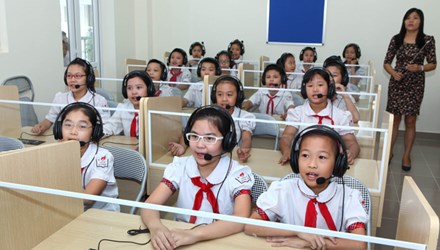MOET's English teaching program not favored in large cities
Many primary schools in Ha Noi operate their own English teaching and learning programs rather than the one from the Ministry of Education and Training.
The Ha Noi Education and Training Department decided in 2011-2012 that the teaching of English would be in accordance with the new curriculum, which has been applied to 20 percent of third graders. The teaching scale would be gradually expanded to reach 70 percent by 2015-2016.
However, in fact, primary school students now learn English under programs determined by the schools’ managers. In most cases, the schools join forces with foreign language centers to organize English classes for students.
There are numerous foreign language centers in Ha Noi, and many possible partners schools can cooperate with. The centers suggest different English curriculums and textbooks, while setting different tuition levels.
The students of the Hoang Liet Primary School in Thanh Tri district, for example, now learn English with Family & Friends. Every student there has to pay VND100,000 a month to attend the classes.
Meanwhile, every student of Le Van Tam Primary School in Hai Ba Trung district has to pay VND6 million a month to attend a class with the teachers from Language Link.
VND 6 million is the common tuition level applied by all the schools cooperating with the foreign language center.
 |
Some schools decided to “have more than one partner” to “have more than once choice” for parents.
H, whose daughter goes to Ai Mo Primary School in Gia Lam district, said the school’s students were asked to choose either DynEd or Language Link. If they choose the former, they would have to pay VND200,000 a month in tuition, and if they choose the latter, they would have to pay VND6 million a year.
H said frankly that she chose neither of them. “Under the current laws, students can enjoy primary education for free. It is unreasonable to ask us to pay for English lessons,” she said.
However, parents are divided about the English teaching curriculums. While H says that she wants to send her daughter to MOET’s free English teaching program, some others believe that it would be better to follow “imported curriculum” suggested by foreign language centers, though they have to pay a high level for the classes.
In Cau Giay district of Ha Noi, Dich Vong B is the only primary school in the locality following MOET’s 10-year English teaching program.
Pham Xuan Tien, deputy director of the Ha Noi education department, noted that over 70 percent of students in Ha Noi are good at English, while only 0.5-1 percent are “below average”.